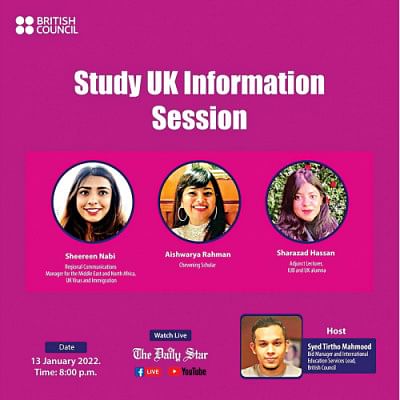Guide to studying in the UK

When it comes to fresh high school graduates looking to pursue higher education abroad, the UK has always been a top choice. Recently in Bangladesh, studying in the UK has seen a surge in popularity for both undergraduate and postgraduate level education.
The Daily Star, in collaboration with the British Council, launched an information session to help students guide their ways to the UK, including application processing, choosing the right university and experienced alumni who share their experiences living in the UK.
Titled 'Study UK Information Session', the webinar was hosted by Syed Tirtho Mahmood, Bid Manager and International Education Services Lead in British Council. Sheereen Nabi, Regional Communication Manager at UK Visas and Immigration, as well as UK alumni Sharazad Hassan and Aishwarya Rahman, Adjunct Lecturer at IUB and Chevening Scholar respectively, attended the webinar as guests.
"As we all know, the UK is well known for its academic excellence, and is the perfect place to develop talents," said Syed Tirtho Mahmood. Regarding international rankings, he added, "UK universities constantly secure top global rankings. The United Kingdom is natively an English-spoken nation, but there are a wide variety of non-native languages spoken as well." Mahmood further stated that studying in the UK is relatively affordable when compared to the US or Australia, but living costs can vary from region to region.
When it comes to work experience, if you are over 16 and have the right Visa, it is easy to find a part-time job while you are studying in the UK. For most courses, and with a Tier 4 (Student) Visa, you will be allowed to work for up to 20 hours during term time.
With the launch of the new Graduate Route in Summer 2021, students can now gain post-study work experience in the UK as well. International students can stay in the UK and work for two years after the completion of undergraduate or postgraduate programs. Students who completed their PhD can stay for three years after completion.
The webinar mentioned important points such as how to apply for a UK visa and how the application process works. "Applying for an application might seem intimidating but a lot of help is available both from the British Council as well as the university the student will be applying to. Although there is an ongoing pandemic in the world, the UK has seen a massive 410% increase in applications from the past years," said Sheereen Nabi. She added that to ensure a successful application, students have to apply online by paying an immigration health fee, which will give the students access to the NHS, which will cover medical bills including Covid-19 treatments.
"After that," continued Nabi, "students will be submitting their biometrics for which they will be asked for an interview. It is better to apply only after getting an offer from a university or higher education center. Students will also need to provide an IELTS certificate for English speaking proof." According to her, students must provide a current passport with at least two blank pages, and proper finance or scholarship document which will ensure that the student can support themselves once they reach the UK. The application may get rejected if the documents provided are written in poor English, any of the documents provided are forged or the bank statements have been duped.
Sharazad Hassan and Aishwarya Rahman shared their experiences as alumni in the UK, giving pointers on how to choose the correct university and how to adjust to a new environment and dorm life without hassle.
"The best way to choose a university is by researching universities by prioritizing the subject you will be studying. Once you set on that, then come costs and scholarships," said Rahman. "When it comes to adjusting to a new place, the sense of loneliness will hit and will stay for a week, doing your things independently will certainly be an experience that sooner or later you will become adjusted to," added Hassan.
"The biggest challenge I faced in the UK was the weather, which is mostly gloomy, whereas Bangladesh is almost always sunny. We may take such details for granted, but it's all about having fun and exploring new places and cultures while keeping studies in mind, of course," stated Hassan, to which Rahman agreed.

 For all latest news, follow The Daily Star's Google News channel.
For all latest news, follow The Daily Star's Google News channel. 



Comments